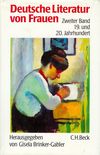Books
- Deutsche Dichterinnen vom 16. Jahrhundert bis zur Gegenwart. Gedichte und Lebensläufe. Ed. with introduction. Frankfurt: Fischer Taschenbuch Verlag, 1978. ISBN 3596219949. Fourth edition: 1991 (ISBN 3596237017); more than 40.000 copies sold. An anthology of sixty women poets. The book contains a substantial 50 pages introduction, outlining the literary history of women writers in German speaking countries from the Middle Ages to the present as well as short biographies and poetry selections of 60 women poets. Reprint on web. New, expanded edition: Cologne: Anaconda Verlag, 2007 (in preparation)
- (Ed.) Zur Psychologie der Frau. Frühe Texte von Lou Andreas‑Salomé, Hedwig Dohm, Isolde Kurz, Rosa Mayreder et. al. Frankfurt: Fischer Taschenbuch Verlag, 1978. 362 pp. (Introduction to texts and authors 32 pp.) ISBN 3596220459. An anthology of texts by largely forgotten women writers of the 19th and early 20th centuries on the subject of gender roles, concepts of femininity, and the psychology of women.
- (Ed.) Frauenarbeit und Beruf. Frühe Texte von Lily Braun, Clara Zetkin, Ricarda Huch, Alice Salomon et. al. Frankfurt: Fischer Taschenbuch Verlag, 1979. 455 pp. (Introduction to texts and authors 42 pp.) ISBN 3596220467. An anthology of texts by women of the bourgeois, proletarian and radical feminist movements on the subject of women and work, equity, wages, division of labor.
- Poetisch‑wissenschaftliche Mittelalter‑Rezeption. Ludwig Tiecks Erneuerung altdeutscher Literatur. Göppingen: Kümmerle, 1980. 299 pp. ISBN 3874524914. A monograph focusing on the poetic and scholarly reception of the Middle Ages by the Jena Romantics, especially Ludwig Tieck; with an overview of the reception of the Middle Ages from Renaissance to Romanticism.
- (Ed.) Fanny Lewald: Meine Lebensgeschichte, Frankfurt: Fischer Taschenbuch Verlag, 1980. 296 pp. (Introduction 20 pp.) ISBN 3596220475. The first reprint (abridged version) of one of the most important autobiographies of the 19th century by the famous Jewish woman author Fanny Lewald.
- (Ed.) Frauen gegen den Krieg. Frühe Texte von Olive Schreiner, Selma Lagerlöf, Rosa Luxemburg, Claire Goll et. al. Frankfurt: Fischer Taschenbuch Verlag, 1980. 340 pp. ISBN 3596220483. (Introduction to texts and authors 45 pp.) A collection of critical essays, prose and poetry by women writers of the 19th and 20th centuries as well as documents of the largely forgotten women's peace movements at the beginning of this century.
- (Ed.) Toni Sender: Autobiographie einer deutschen Rebellin. Frankfurt: Fischer Taschenbuch Verlag, 1981. 323 pp. (Introduction 18 pp.) ISBN 3596220440. The first German edition of the autobiography by the Jewish socialist Toni Sender, one of the very few women "Reichstagsabgeordneten" in Weimar Germany, who later escaped the Nazis, and immigrated to the United States to become a high ranked official of the United Nations.
- (Ed.) Kämpferin für den Frieden: Bertha von Suttner. Frankfurt: Fischer Taschenbuch Verlag, 1983. 216 pp. (Introduction 20 pp.) ISBN 359622053X. The first anthology of Bertha von Suttner’s writings. Selections from her memoirs, diaries, her political writings and speeches with an introduction.
- Lexikon deutschsprachiger Schriftstellerinnen: 1800 ‑ 1945. Munich: Deutscher Taschenbuch Verlag, 1986 (with K. Ludwig and A. Wöffen). 364 pp. ISBN 3423032820. Bio-bibliographies of 214 women writers from the 19th to the 20th century.
- (Ed.) Deutsche Literatur von Frauen. Vol.1: Vom Mittelalter bis zum Ende des 18. Jahrhundert. Munich: C.H. Beck Verlag, 1988. 558 pp. ISBN 3406328148. A collection of critical essays on German women writers from the early Middle Ages to the 18th century.
- (Ed.) Deutsche Literatur von Frauen. Vol.2: Vom 19. Jahrhundert bis zur Gegenwart. München: C.H. Beck Verlag, 1988. 584 pp. ISBN 3406330215. A collection of critical essays on Geman women writers from the 19th to the 20th century.
- (Ed.) Encountering the Other(s). Studies in Literature, History and Culture. Albany: State University of New York Press, 1995. 416pp. ISBN 0791421600. Contributors to this book from German, English, Spanish, philosophy, history, political science, and education focus on the serious political questions posed by the problems of strangeness, "the other." With a variety of perspectives, ranging from the biological to the psychological, the essays address cultural, and political implications of 'otherness.'
- (Ed.) Writing New Identities: Nation, Gender and Multiculturalism in Contemporary Europe. Minneapolis: University of Minnesota Press, 1997 (together with Sidonie Smith). ISBN 0816624607. The essays of this book explore from a variety of theoretical and critical perspectives the interrelationships of nationalisms, gender and representation practices. They take up diverse cultural texts, personal narrative, film, essays, magazines, poetry, fiction, across the breadth of Europe, from Ireland to Russia, from France to the former Yugoslavia, from Sweden to Germany and Italy.
- (Ed.) 'If We Had the Word.' Ingeborg Bachmann: Views and Reviews. Riverside, CA: Ariadne Press, 2004 (together with Markus Zisselsberger). ISBN 1572411309.
- "'Image in Outline. Reading Lou Andreas-Salomé."' New York, London: Continuum 2012.
This new study introduces the reader into Lou Andreas-Salomé’s critical and creative engagement with modern thought. Through detailed explorations of some of her major texts, Brinker-Gabler examines Andreas-Salomé’s unique perspective within contemporary discourses attentive to meaning, perception, memory and the unconscious. Making use of conceptual frameworks of Irigaray and Benjamin, Freud and Kristeva, among others, Brinker-Gabler argues that Andreas-Salome displaces dominant visions of gender and sexuality, culture, religion, and creativity with multifaceted revisions through the female lens of a creative thinker. With her aesthetics of the “in-visible,” as Brinker-Gabler calls it, Andreas-Salomé seeks to retrieve the multilayered past that is embedded in the present and to give positive accounts of sexual and cultural difference, experience, narcissism, and becoming.

















